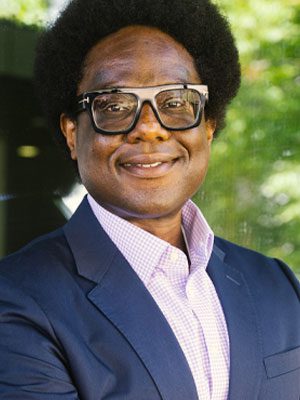Osagie K. Obasogie

- Haas Distinguished Chair
Biography
Osagie K. Obasogie is the Haas Distinguished Chair and Professor of Law at the University of California, Berkeley School of Law with a joint appointment in the Joint Medical Program and School of Public Health. He received his B.A. in Sociology and Political Science (with distinction in both majors) from Yale University, his J.D. from Columbia Law School where he was a Harlan Fiske Stone Scholar, and his Ph.D. in Sociology from the University of California, Berkeley, where he was a fellow with the National Science Foundation.
Obasogie’s scholarly interests include Constitutional law, policing and police use of force, sociology of law, bioethics, race and inequality in law and medicine, and reproductive and genetic technologies. His writings have spanned both academic and public audiences, with journal articles in venues such as the Harvard Law Review (forthcoming), University of Pennsylvania Law Review, Virginia Law Review, Cornell Law Review, California Law Review, and the Law & Society Review along with commentaries in outlets including The New York Times, The Washington Post, The Atlantic, Slate, Los Angeles Times, Boston Globe, and New Scientist. His first book, Blinded By Sight: Seeing Race Through the Eyes of the Blind (Stanford University Press) was awarded the Herbert Jacob Book Prize by the Law and Society Association. Obasogie’s second book, Beyond Bioethics: Toward a New Biopolitics (co-edited with Marcy Darnovsky, University of California Press) is an edited volume that explores the past, present, and future of bioethics.
Obasogie is an elected member of the National Academy of Medicine and has also been awarded a Guggenheim Fellowship. His current work examines the role of science, medicine, and medical professionals in hindering the ability to hold police officers accountable when they use excessive force; analyzes the legacy of the American eugenics movement and its contemporary impact on law, science, medicine, and technology; studies how legal doctrine produces police violence; and exposes the often overlooked limitations of DNA databases when they are used in criminal investigations.
Research Interests
- Bioethics
- Constitutional Law
- Policing and Police Use of Force
- Reproductive and Genetic Technologies
- Race in Law and Medicine
Education
- PhD – University of California, Berkeley
- JD – Columbia Law School
- BA – Yale University
Selected Books, Articles, and Essays
Books
- Osagie K. Obasogie, Blinded by Sight: Seeing Race Through the Eyes of the Blind, Stanford University Press (2014)
- Osagie K. Obasogie and Marcy Darnovsky (eds.), Beyond Bioethics: Toward a New Biopolitics, University of California Press (2018).
Articles and Essays
- Osagie K. Obasogie, Excited Delirium, Policing, and the Law of Evidence, 138 Harvard Law Review _____ (forthcoming)
- Osagie K Obasogie and Peyton Provenzano, Race, Racism, and Police Use of Force in 21st Century Criminology: An Empirical Examination, 69 UCLA Law Review 1206 (2023).
- Rachel Morello-Frosch and Osagie K. Obasogie, The Climate Gap and the Color-Line: Racial Inequities in Climate Health Impacts, 398 New England Journal of Medicine 943 (2023).
- Osagie K. Obasogie, Can Originalism Save Bioethics? in Critical Approaches to Science and Religion (Sheldon et. al. eds.) Columbia University Press (2023).
- Osagie K. Obasogie and Zachary Newman, Colorblind Constitutional Torts, 95 Southern California Law Review 1137 (2022).
- Osagie K. Obasogie and Anna Zaret, Plainly Incompetent: How Qualified Immunity Became an Exculpatory Doctrine of Police Excessive Force, 170 University of Pennsylvania Law Review 407 (2022).
- Osagie K. Obasogie, Excited Delirium and Police Use of Force, 107 VIRGINIA LAW REVIEW 1545 (2021).
- Osagie K. Obasogie and Anna Zaret, Medical Professionals, Excessive Force, and the Fourth Amendment, 109 CALIFORNIA LAW REVIEW 1 (2021).
- Osagie K. Obasogie and Zachary Newman, The Endogenous Fourth Amendment: An Empirical Assessment of How Police Understandings of Excessive Force Become Constitutional Law, 104 CORNELL LAW REVIEW 1281 (2019).
- Osagie K. Obasogie and Zachary Newman, Constitutional Interpretation Without Judges: Police Violence, Excessive Force, and Remaking the Fourth Amendment, 105 VIRGINIA LAW REVIEW 425 (2019). Symposium Contribution.
- Osagie K. Obasogie and Zachary Newman, The Futile Fourth Amendment: From Individual to Structural Understandings of Police Violence, 112 NORTHWESTERN UNIVERSITY LAW REVIEW 1465 (2018). Symposium Contribution.
- Osagie K. Obasogie, Can the Blind Lead the Blind? Rethinking Equal Protection Jurisprudence Through an Empirical Examination of Blind People’s Understanding of Race, 15 UNIVERSITY OF PENNSYLVANIA JOURNAL OF CONSTITUTIONAL LAW 705 (2013).
- Osagie K. Obasogie and Helen Theung, Moore is Less: Why the Development of Induced Pluripotent Stem Cells Might Lead Us to Rethink Differential Property Interests in Excised Human Cells, 16 STANFORD TECHNOLOGY LAW REVIEW 51 (2012).
- Osagie K. Obasogie, Prisoners as Human Subjects: A Closer Look at the Institute of Medicine’s Recommendations to Loosen Current Restrictions on Using Prisoners in Scientific Research, 6 STANFORD JOURNAL OF CIVIL RIGHTS AND AND CIVIL LIBERTIES 41 (2010).
- Osagie K. Obasogie, Do Blind People See Race? Social, Legal, and Theoretical Considerations, 44 LAW & SOCIETY REVIEW 585 (2010).